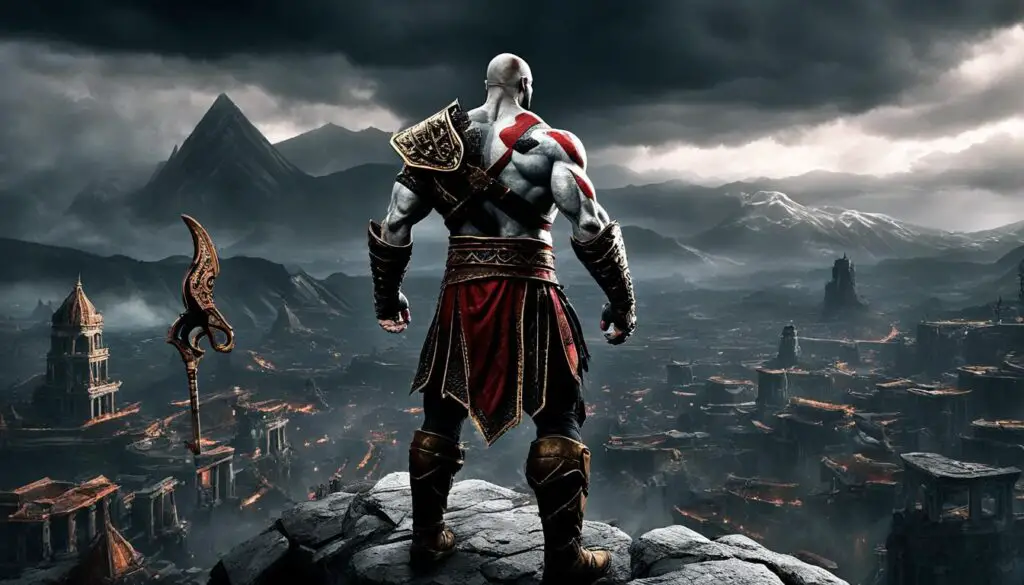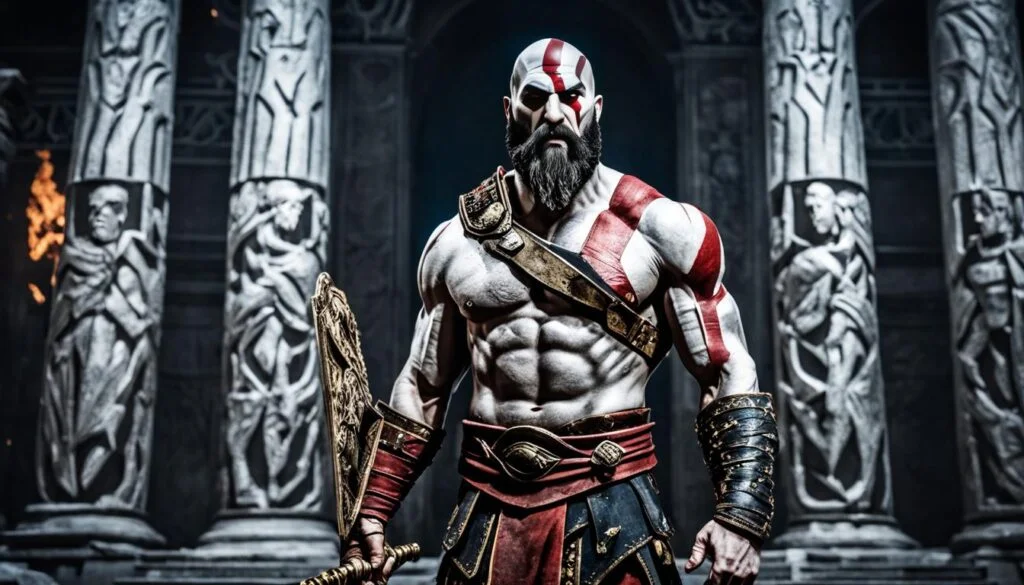Are you fascinated by the ancient tales and legends of Greek mythology? Chances are you’ve heard of Kratos, the formidable figure associated with strength and power. But was Kratos a real god in Greek mythology, or just a creation of myth and imagination?
In Greek mythology, Kratos is known as the divine personification of strength, the son of Pallas and Styx. He is often depicted as a merciless enforcer, carrying out the authority of Zeus. While Kratos is mentioned in various ancient texts, there is no evidence of him being worshipped as a deity. Instead, he is considered a personified concept of power and authority.
Despite his portrayal in popular culture, such as video games, the true nature of Kratos in Greek mythology remains a subject of debate and interpretation. So, let’s delve deeper into the origins, role, and significance of this mythological figure.
Key Takeaways:
- Kratos in Greek mythology is the personification of strength and power.
- There is no evidence of Kratos being worshipped as a deity.
- He is often portrayed as an enforcer of Zeus’ authority.
- The exact role and significance of Kratos vary depending on different myths and interpretations.
- The portrayal of Kratos in popular culture, such as video games, differs from the traditional representation in ancient Greek mythology.
The Origins of Kratos
In Greek mythology, Kratos has a distinctive lineage that sheds light on his origins. According to Hesiod’s Theogony, he is the son of Pallas and Styx, both powerful figures in Greek mythology. Kratos has three siblings who are personifications of specific traits: Nike, the personification of Victory, Bia, the personification of Force, and Zelus, the personification of Glory.
Styx, the mother of Kratos and his siblings, played a significant role in their rise to power. After the Titanomachy, Styx sought a position in Zeus’ regime, which ultimately led to the elevation of Kratos and his siblings to exalted positions within Zeus’ government. This connection to the ruling deity underscores Kratos’ significance in Greek mythology.
The role and significance of Kratos vary across different myths and interpretations. While these variations exist, the common thread remains that Kratos is an integral part of Greek mythology, embodying the concept of strength and authority in various contexts.
Kratos in Ancient Greek Literature and Art
Kratos, one of the children of Styx and Pallas, is mentioned in Hesiod’s Theogony. In this ancient Greek text, Kratos is depicted as dwelling with Zeus and playing a crucial role in enforcing Zeus’ authority.
Aeschylus’ Prometheus Bound further highlights the significance of Kratos. In this tragic play, Kratos is portrayed as one of Zeus’ enforcers, giving orders to Hephaestus to chain Prometheus as punishment for stealing fire from the gods.
Throughout Greek literature and art, Kratos serves as a symbol of Zeus’ absolute authority and the adherence to his rule. Representing brutal and uncompromising power, Kratos embodies the essence of Zeus’ dominion and justice.
Theogony: Kratos in Greek Mythology
In Hesiod’s Theogony, Kratos is mentioned as one of the children of Styx and Pallas. According to this epic poem, Kratos resides with Zeus and assists in maintaining Zeus’ power and control over the world.
Prometheus Bound: Kratos’ Role
In Aeschylus’ Prometheus Bound, Kratos takes on a crucial role as one of Zeus’ enforcers. Commanding Hephaestus to chain Prometheus, Kratos exemplifies Zeus’ unwavering authority and the consequences of opposing it.
Kratos in Ancient Greek Art
Ancient Greek art frequently portrays Kratos as a symbol of Zeus’ absolute authority. Through sculptures, paintings, and other artistic expressions, Kratos is depicted as an embodiment of raw power and dominance.
These artistic representations not only serve as visual interpretations of Zeus’ rule but also highlight the hierarchical and oppressive aspects of ancient Greek society.
The Concept of Kratos in Greek Mythology
Kratos, in Greek mythology, serves as the personification of power and authority. While not worshipped as a traditional deity, Kratos embodies the concept of strength and dominion. The Ancient Greek word “kratos” itself translates to “strength” or “power,” symbolizing the absolute authority of Zeus. Throughout mythological narratives, Kratos often represents the oppressive aspects of Zeus’ rule, serving as a symbol of his regime’s dominion. In Greek society, the figure of Kratos reinforces the belief in a hierarchical system, wherein Zeus reigns as the ultimate source of power and control.
Despite not being a traditional deity, Kratos carries profound symbolism within Greek mythology. His association with Zeus and the embodiment of strength highlights the hierarchical structure of society, with Zeus positioned at its apex. Through the concept of Kratos, Greek mythology emphasizes the supremacy and absoluteness of Zeus’ rule, reflecting the societal belief in the importance of a centralized authority.
Kratos in Popular Culture

In recent years, Kratos has become an iconic video game character in the God of War series. The portrayal of Kratos in these games deviates from the traditional representation in ancient Greek mythology, introducing a new narrative that captivates players worldwide.
In the God of War series, Kratos is depicted as a renegade demigod on a mission for vengeance against the Greek pantheon, particularly Zeus. Players embark on an epic journey as Kratos battles powerful gods, monsters, and mythical creatures, immersing themselves in a world inspired by ancient Greek mythology.
This modern interpretation of Kratos has propelled him into the realm of popular culture, where he has become a recognizable figure among gamers and enthusiasts. The intense action, immersive storytelling, and compelling character development have made Kratos a beloved and enduring presence in the gaming community.
Conclusion
The true nature of Kratos in Greek mythology remains a subject of interpretation and debate. Mentioned in ancient texts and portrayed in various artistic works, Kratos is a complex and multifaceted figure. As the personification of strength and power, Kratos embodies the hierarchical systems and absolute authority associated with Zeus. His role in enforcing Zeus’ rule highlights the significance of dominion and the oppressive aspects of power in Greek society.
However, the portrayal of Kratos in popular culture, specifically in video games like God of War, has expanded his narrative and introduced him to a wider audience. In these modern adaptations, Kratos is depicted as a renegade demigod seeking vengeance against the Greek pantheon, including Zeus. The evolution of Kratos’ character showcases the enduring fascination with Greek mythology and its ability to captivate and resonate with contemporary storytelling.
Overall, Kratos’ interpretation in Greek mythology reflects the enduring themes of strength, power, and the complexities of authority. Whether as an embodiment of Zeus’ dominion or a renegade seeking revenge, Kratos stands as a symbol of the ongoing relevance and appeal of Greek mythological figures in popular culture and beyond.
FAQ
Was Kratos a real figure in Greek mythology?
Kratos is a mythological figure in Greek mythology. While he is mentioned in various ancient texts, there is no evidence that he was worshipped as a deity.
Who were Kratos’ parents and siblings?
According to Greek mythology, Kratos is the son of Pallas and Styx. His siblings include Nike (Victory), Bia (Force), and Zelus (Glory).
How is Kratos depicted in ancient Greek literature and art?
Kratos is often portrayed as a symbol of Zeus’ absolute authority and justice. He is depicted as an enforcer of Zeus’ rule and is associated with brutal and uncompromising power.
What is the concept of Kratos in Greek mythology?
Kratos personifies the concept of power and authority. He represents the hierarchical systems and absolute authority associated with Zeus.
How is Kratos portrayed in popular culture?
In popular culture, specifically in the video game series God of War, Kratos is depicted as a renegade demigod seeking vengeance against the Greek pantheon, including Zeus.
What is the significance of Kratos in Greek mythology?
The true nature of Kratos in Greek mythology remains a subject of interpretation and debate. His evolving portrayals reflect the ongoing fascination with Greek mythology and its application in modern storytelling.




